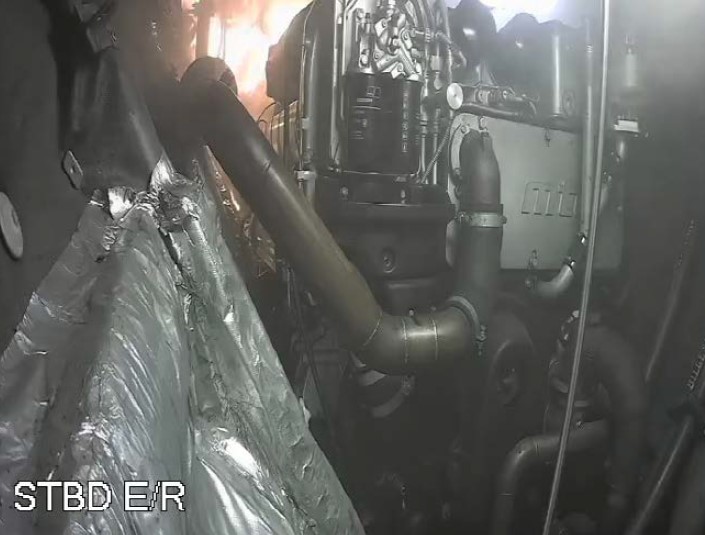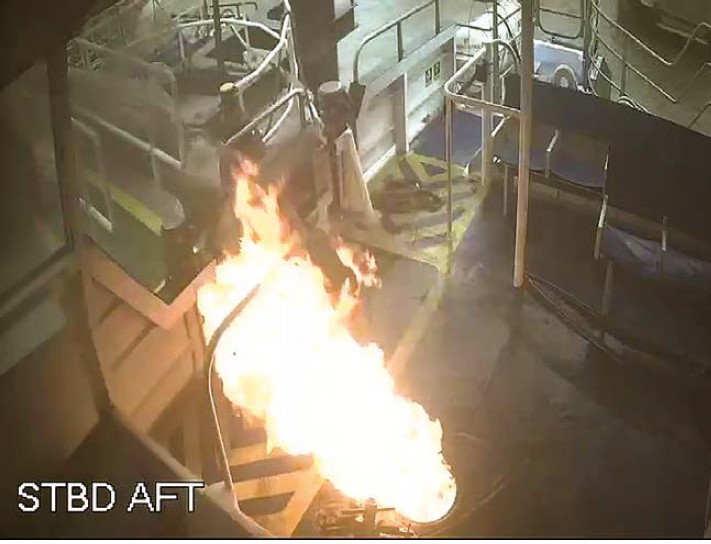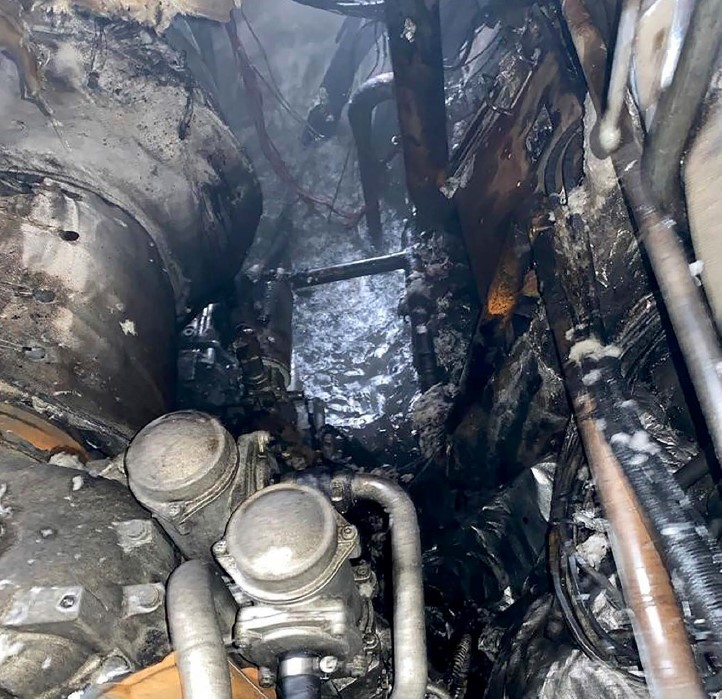- IP Code: Mandatory Code enters into force on 1 July. Make sure your company is up to speed with the changes.
- Early Bird tickets available for the IMCA Global Summit 2024. 3-4 December, Utrecht, Netherlands. Members can save £400.
- Discover how we are helping Members reduce emissions: Explore the ProjectGHG hub now.
- Now booking. Join the Lifting and Rigging community at our Technical Seminar in Amsterdam. Thursday 12 September 2024
- Now booking. Underwater Ship Husbandry Seminar. 10 October 2024, Singapore.
MAIB: Engine room fire flashover
The Marine Accident Investigation Branch Safety Digest 2/2022 includes an incident in which there was a flashover in a vessel engine room.
What happened
A high speed ferry was on passage after a period of maintenance. There were no passengers on board, just the master and two crew. During the passage, the fire alarm sounded for the starboard engine compartment; the master monitored the closed-circuit television (CCTV) and after a few moments saw smoke and then flames.



What went right
The master and crew followed the emergency procedure for an engine fire: the engine was shut down, the compartment was sealed off, and the fixed carbon dioxide (CO2) fire extinguishing system was initiated. The master assessed that the situation was under control. He informed the port authority of his intention to continue to the intended berth and requested that the local fire brigade meet the ferry on arrival. The master continued on passage with one engine in use. The crew monitored the bulkhead and deckhead temperatures around the compartment; water hoses were prepared for boundary cooling although this was not judged necessary.
What went wrong
Once the ferry was berthed, the local fire and rescue service boarded the vessel to take charge of the situation. Without liaising with the crew, one of the fire officers opened the access hatch to the starboard engine, causing rapid reignition of the fire with significant flames and smoke emanating from the compartment. This forced the fire and rescue team to retreat to gather their firefighting equipment and the fire was eventually extinguished by completely flooding the compartment with water. The reignition of the fire caused severe damage to the engine and the starboard engine compartment, requiring extensive repairs.
The lessons
- The master and crew took the appropriate actions in this situation. The closing down of the engine compartment and timely use of the fixed firefighting system stopped the fire from spreading further and reduced the flames. Hotspot monitoring of the compartment by the crew ensured that they were prepared to react to any change to the situation. The engine compartment needed to remain sealed until the deckheads achieved an ambient external temperature. The master also made the appropriate calls to the local authorities, ensuring that assistance would be on hand when the ferry arrived alongside.
- Poor communication: The local fire and rescue service inadvertently reignited the fire by opening the access hatch. This was inappropriate as the situation was under control and the correct action would have been to leave the compartment sealed until the deckhead temperature had fallen to ambient level. The master remains responsible for the vessel and communication is vital to build a clear picture of the situation. The fire officer’s actions were well meaning; however, the outcome was avoidable damage to the vessel.
IMCA can draw on no similar instances of an actual vessel fire being made worse by lack of communication or lack of co-operation between the vessel crew and the local fire brigade. However, the main issue is here is that a situation was made much worse by that lack of communication. This is in no way unique and is to be guarded against.
Work hard to maintain clear and open communications, whether between vessel crew and project crew, vessel crew and management, deck and bridge, rigging crew and crane operator, client and contractor, contractor and sub-contractor, to name but a few.
Safety Event
Published: 21 December 2022
Download: IMCA SF 29/22
IMCA Safety Flashes
Submit a Report
IMCA Safety Flashes summarise key safety matters and incidents, allowing lessons to be more easily learnt for the benefit of all. The effectiveness of the IMCA Safety Flash system depends on Members sharing information and so avoiding repeat incidents. Please consider adding [email protected] to your internal distribution list for safety alerts or manually submitting information on incidents you consider may be relevant. All information is anonymised or sanitised, as appropriate.
IMCA’s store terms and conditions (https://www.imca-int.com/legal-notices/terms/) apply to all downloads from IMCA’s website, including this document.
IMCA makes every effort to ensure the accuracy and reliability of the data contained in the documents it publishes, but IMCA shall not be liable for any guidance and/or recommendation and/or statement herein contained. The information contained in this document does not fulfil or replace any individual’s or Member's legal, regulatory or other duties or obligations in respect of their operations. Individuals and Members remain solely responsible for the safe, lawful and proper conduct of their operations.
